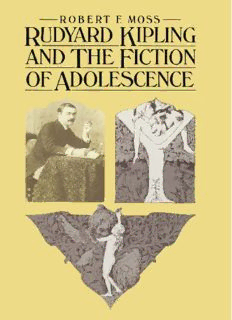
Rudyard Kipling and the Fiction of Adolescence PDF
Preview Rudyard Kipling and the Fiction of Adolescence
RUDYARD KIPLING AND THE FICTION OF ADOLESCENCE By the same author KARLOFF AND COMPANY: The Horror Film CHARLIE CHAPLIN JUDGE HORTON AND THE SCOTTSBORO BOYS (with Barbara Bauer) RUDYARD KIPLING AND THE FICTION OF ADOLESCENCE Robert F. Moss © Robert F. Moss 1982 Softcover reprint of the hardcover 1st edition 1982 All rights reserved. No part of this publication may be reproduced or transmitted, in any form or by any means, without permission First published 1982 by THE MACMILLAN PRESS LTD London and Basingstoke Companies and representatives throughout the world ISBN 978-1-349-05711-5 ISBN 978-1-349-05709-2 (eBook) DOI 10.1007/978-1-349-05709-2 To My Mother and Father "It's not brutality," murmured little Hartopp, as though answering a question no one had asked. "It's boy; only boy." Stalky & Co. Contents Acknowledgements lX Introduction Xl 1 The Foundations 1 2 The Adolescent Strain 34 3 Kipling's Schoolroom: The Evolution of a Training Process 58 4 Kipling's Philosophy of Education in Its Final Form 75 5 Clash of Loyalties: Kipling's Men in Conflict 91 6 Between Two Worlds: The Divided Self in Kipling's Adolescents 107 7 Kipling's Triumph: The Double Boyhood of Kimball O'Hara 128 Conclusion 142 Appendix 148 Notes 151 Bibliography 158 Index 161 Acknowledgements I wish to acknowledge my indebtedness to Professors Louis Cornell and Carl Woodring, under whose patient and discerning supervision an earlier version of this work - my doctoral dis sertation at Columbia Univeristy - was written. I am also very grateful to my good friend Barbara Bauer for her generous assistance in the preparation of the manuscript. The author and publishers acknowledge with thanks the co operation of Charles Scribner's Sons, Doubleday & Co. Inc. and A. P. Watt Ltd on behalf of the National Trust for permission to quote extracts from the works and autobiography of Rudyard Kipling. IX Introduction "Time that with this strange excuse," wrote W.H. Auden, "Pardons Kipling and his views .... "Forty years after this poem was written, Kipling is still one of the most controversial and enduringly popular authors, with a full complement of advocates and detractors fiercely squared off against each other. The first thing the student of Kipling learns is that his subject has been the victim of critical neglect; the second is that this "neglect" occupies two or three shelves in the library and that essays, biographies, and full-length studies of Kipling (in four different languages) are there in abundance. It is the abiding paradox of Kipling scholarship that while his reputation stopped growing about 1902, the literature about him did not. Of course this curious situation may in part be attributed to Kipling's on going popular success ("He had always had his audience," John Beecroft points out in The Best of Kipling); he is simply too durable to be ignored. But it must also be remembered that extra-literary factors in Kipling's work have played a role; as the foremost spokesman for Tory imperialism, he inevitably drew a good deal of attention (both favourable and unfavourable) for his political views. The job of categorizing the rather extensive body of critical writing on Kipling has been undertaken by Elliot Gilbert in the introduction to his Kipling and the Critics, a collection of essays by different critics. Gilbert perceives three major traditions in Kipling scholarship: (1) those who damn Kipling for his right wing politics; (2) those who praise him for the same reason (and, more significantly, those who defend, without necessarily excusing, his political convictions); and (3) those who focus on the aesthetic aspects of Kipling's work. In Gilbert's schema, Richard Le Galliene's Rudyard Kzpling: A Criticism, Robert Buchanan's essay "The Voice of the Hooligan" and W .J. Peddicord's Rudyard Reviewed would belong in the first category; Walter Besant's reply to Buchanan (which appeared along with the Buchanan XI
